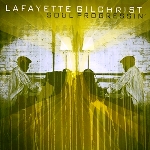Home » Jazz Articles » Album Review » Lafayette Gilchrist: Soul Progressin'
Lafayette Gilchrist: Soul Progressin'
Soul Progressin' is Gilchrist's third album with his eight-piece band the New Volcanoes, following The Music According to Lafayette Gilchrist (Hyena, 2004) and Towards The Shining Path (Hyena, 2005). His most recent release was Three (Hyena, 2007), made with bassist Anthony "Blue" Perkins and drummer Nathan Reynolds, both members of the New Volcanoes.
Perkins and Nathan—whose funk and soul curriculum vitae includes a spell in singer Wilson Pickett's band—lay down reiterative grooves from which Nathan only rarely deviates, while Perkins takes a looser approach in which the bootalicious funk of classic-era Funkadelic bassist Bootsy Collins is writ large. Perkins' extended solo on the moody "Come Get Some" conjures up Collins at his wildest, framed by a broiling, harmonically dissonant horn arrangement which at times sounds like a newly discovered fortissimo passage from Stravinsky's Rite Of Spring (circa 1913).
This tension between the edgy and the good-time runs through most of Soul Progessin', hitting the head and the feet with equal force. Only the title track and "Uncrowned" deviate, and they're on a short rein. "Soul Progressin'" is unadorned funk, in which the horn section comes closest to a straightforward Stax or James Brown sound. The track is given character by Gilchrist's pumping, theme-centric solo and a growling, post-Cootie Williams trumpet workout from either Mike Cerri or Freddy Dunn. "Uncrowned" is for unaccompanied piano, and is dedicated to the late Andrew Hill.
The music's edginess is tinged with a feeling of anger and impatience, at its most powerful on the 9:35 "Those Frowning Clowns." The title, Gilchrist's liner notes explain, refer to "years of official lies and needless war (by) the current leadership." Mingus would almost certainly be enthusiastic about Lafayette Gilchrist, who's moving the music forward without losing sight of either its past or its potential for bringing about social change.
Track Listing
Soul Progressin'; Between Us; Come Get Some; Uncrowned; Those Frowning Clowns; Detective's Tip; Many Exits No Doors.
Personnel
Lafayette Gilchrist
pianoLafayette Gilchrist: piano; John Dierker: tenor saxophone, bass clarinet; Gregory L Thompkins: tenor saxophone; Gabriel Ware: alto saxophone; Mike Cerri: Trumpet; Freddy Dunn: trumpet; Anthony "Blue" Jenkins: bass; Nathan Reynolds: drums.
Album information
Title: Soul Progressin' | Year Released: 2008 | Record Label: Hyena Records
< Previous
Rob Schwimmer at the Northampton Cent...
Next >
Movin' Up
Comments
About Lafayette Gilchrist
Instrument: Piano
Related Articles | Concerts | Albums | Photos | Similar ToTags
For the Love of Jazz
 All About Jazz has been a pillar of jazz since 1995, championing it as an art form and, more importantly, supporting the musicians who create it. Our enduring commitment has made "AAJ" one of the most culturally important websites of its kind, read by hundreds of thousands of fans, musicians and industry figures every month.
All About Jazz has been a pillar of jazz since 1995, championing it as an art form and, more importantly, supporting the musicians who create it. Our enduring commitment has made "AAJ" one of the most culturally important websites of its kind, read by hundreds of thousands of fans, musicians and industry figures every month.




















